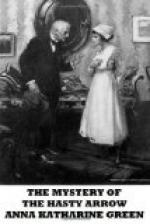That evening, just at dusk, a taxicab which had been wandering up and down a well-kept block in Eighty-seventh Street stopped suddenly in front of a certain drug-store to let an old man out. He seemed very feeble and leaned heavily on his cane while crossing the sidewalk toward the store. But his face was kindly, and his whole aspect that of one who takes the ills of life without bitterness or complaint. When halfway to his goal,—for twenty steps are a journey to one who has to balance himself carefully with every one,—he slipped or stumbled, and his cane flew out of his hand. Happily—because he seemed unable to reach it himself—a young girl just emerging from the drug-store saw his plight and stooping for the stick, handed it to him. He received it with a smile, and while it was yet in both of their hands, said in the most matter-of-fact way in the world:
“Thank you, little Miss Duclos.” Then suddenly: “Where’s your aunt?”
She did not stop to think. She did not stop to ask herself what this question meant or whether this old gentleman who seemed to know so much about her and the family’s secrets had a right to ask it, but blurted out in nervous haste as if she knew of nothing else to do, “She’s gone,” and then started to run away.
“Come back, little one.” His tone was very imperative, but for all that of a nature to win upon a frightened child. “I know she’s gone,” he added soothingly as she looked back, hesitating. “And I’m sorry, for I have something for her. I recognized you the moment you stepped out of the store; but I see that you don’t remember me. But why should you? Little girls don’t remember old men.”
Again that benevolent smile as he poked about in one of his pockets and finally drew out a little parcel which he held out toward her.
“This belongs to your aunt. See, it has her name on it, Madame Antoinette Duclos. It came to the lodging-house in Fifty-third Street just after she left, and I was asked to bring it to her. I was going to your house as soon as I had done my little errand at this store, but now that I have met you, I will ask you to see that she gets it.”
The girl looked down at the parcel, then up at him, and reaching out her hand, took it.
His old heart, which had almost stopped, beat again naturally and with renewed strength. He was on the correct trail. When Mrs. Duclos and the rest of them had said that they knew of no one of their name in this country but themselves, it was because the Madame of the Hotel Universal was of their family—the widow of their brother, as this child’s acknowledgment showed.
He was turning back to his taxi when the child, still trembling very much, took a step toward him and said:
“I don’t know where to find my aunt. She didn’t tell us where she was going; and—and I had rather not take this parcel back with me. Mother don’t like us to speak of Aunt Nettie; and—and I don’t believe Aunt Nettie would care to have this now. Won’t—won’t you forget about it, sir, if I promise to tell her some day that it was brought back and I wouldn’t take it?”




